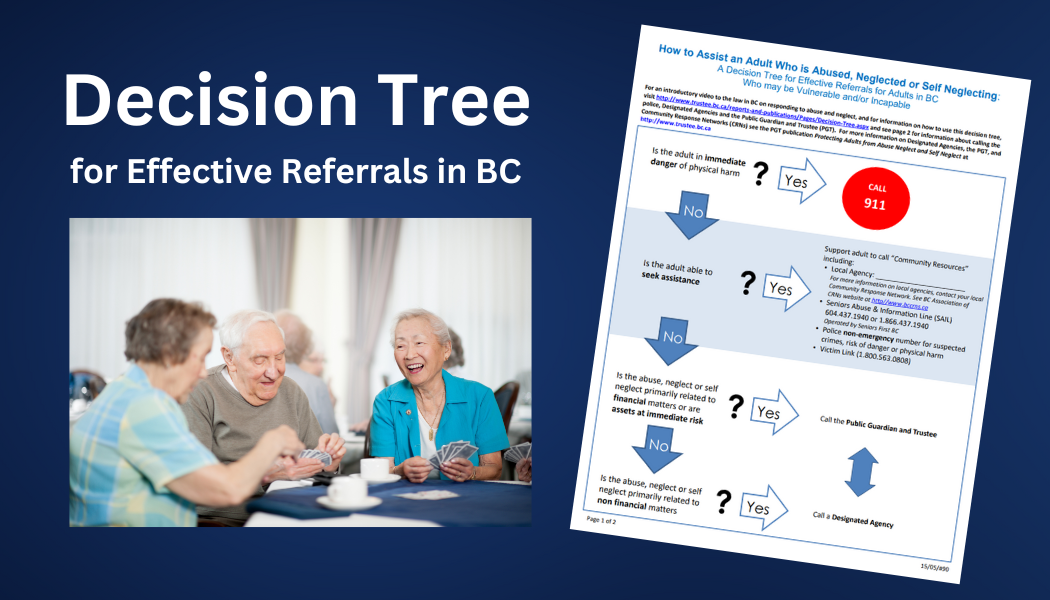[Decision Tree] When Local Won’t Do: Referrals for Vulnerable Adults in BC

Hundreds of adults in BC use services that help them with quality of life: meal services, seniors’ centres, day programs and more. But when an adult is vulnerable or incapable of making their own decisions, how do we intercede to ensure their best interests are looked after? The Decision Tree, a purpose-designed tool, helps make effective referrals for vulnerable adults deemed incapable in BC. It’s important to understand the background legislation to properly use the tool.
Community response is usually coordinated by local Community Response Networks (CRNs). Calls often come from concerned neighbours, financial institutions, local businesses, healthcare workers and even family members. In most cases, local agencies can assist with a variety of services, but not always.
Promoting to Agencies with Authority
Informal agencies may be unable to intercede because the person cannot seek assistance on their own as the result of physical restraint or disability, or if an illness, injury or disease affects their ability to make decisions about their well-being. It also includes self-neglect, such as living in unsanitary conditions, malnutrition, untreated illness and hoarding. CRNs and local agencies may have to turn to the guidance of the Adult Guardianship Act of British Columbia (the Act) for next steps.
The Act sets out the laws that guide people in the legal, financial, social and health sectors to make effective referrals. It specifies the roles of designated agencies, the Public Guardian and Trustee (PGT), and the police to intervene on the person’s behalf, depending on the nature of the issue.
The Act states these guiding principles for dealing with adults in BC:
- Honouring of self-determination
- Presumption of capability
- Different ways of communicating
- Least intrusive, least restrictive, most effective forms of support
- Court as a last resort
BC’s five regional health authorities, Providence Health Care Society (Lower Mainland), and Community Living BC (CLBC) are the appointed designated agencies under the Act. Designated agencies provide frontline responses and are required to investigate reports of abuse or neglect if the victim cannot seek assistance independently. When applicable, criminal offences are reported to the police. The PGT assists with financial matters.
It’s critical to recognize that each affected adult has individual needs that require personalized solutions. For example, the regional health authority may intervene to help with the physical, mental and emotional effects of abuse and neglect, local police may also be called to help gain access to the property, for help with a restraining order or to keep the peace. Police can also speak privately with the adult to ascertain the circumstances. The PGT may be called upon to investigate financial abuse and neglect when an adult is mentally incapable and their assets are at risk of loss through poor decision-making, being stolen through fraud or manipulation, or being withheld by family members.
The Decision Tree: When to Refer and to Where?
The Decision Tree: Assisting an Adult Who is Abused, Neglected or Self-Neglecting is a tool collaboratively designed by the PGT, RCMP “E” Division and the Health Authorities to help service providers make effective referrals when they witness abuse or neglect. The tool guides users through a series of questions to guide decisions about the type and severity of abuse or neglect, and where to refer the case. It also provides information about the roles of designated agencies, the PGT and the police.
Through four succinct questions, the user will determine if the adult is in immediate danger of physical harm (call 911) or if they can seek assistance from the local CRN, Seniors Abuse and Information Line (SAIL), police for a suspected crime, and/or Victim Services.
If it is determined the adult cannot independently seek help, the assessor will make a referral to the PGT for financial matters or assets at immediate risk, or the local designated agency for abuse, neglect and self-neglecting behaviour related to non-financial matters. This helpful tool offers guidance on each category, links to relevant sections of the Adult Guardianship Act and informs users what they can expect once the connection is made.
Who Should Make Referrals with the Decision Tree?
While the Decision Tree is available for anyone in contact with vulnerable or older adults, it’s recommended to have an understanding of the legislation provided by the Adult Guardianship Act and an understanding of the process.
Learn more about the Decision Tree by connecting with the BC CRN program team, who will happily walk you through this simple yet effective resource.
Members of the public, businesses and families are recommended to take the BC CRN program See Something, Say Something! Reducing Risk for Older Adults. Participants may be surprised to learn that many services are available locally by contacting the CRN in their community who can either coordinate a local response or escalate the issue to a higher level, such as a designated agency.
The Seniors Abuse and Information Line at 1.866.437.1940 is also available for reporting suspected cases of adult abuse, neglect or self-neglect. The community members may also call 211 to learn more about the nearest services.
-
By
BC CRNS
-
Published
Apr 10, 2023
-
Subject Area
- Referral & Systems Navigation
-
Audience
- Caregivers, Seniors & Volunteers
-
Category
- Referrals
Newsletter
Sign up for the Healthy Aging CORE BC e-news to keep up-to-date with activity from the platform and the Community-Based Seniors Services (CBSS) sector across the country.
